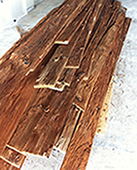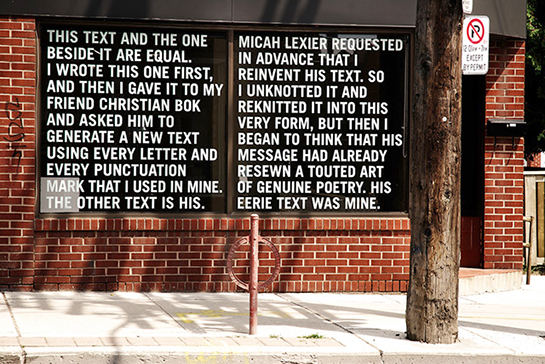This week’s assortment of stuff in triplicate has no theme whatsoever. Or perhaps that’s a little defeatist? What I should say, rather, is that the theme of this post has yet to be determined, but I am quietly confident that you, astute reader, will immediately spot the common thread in this seemingly random rug of nonsense.
 1. Malvern got wood. (Sorry.) Yes indeed, the mushroom wood has arrived and will soon be affixed handsomely to various Malvernian walls. Isn’t she lovely? For those of you lacking knowledge vis-à-vis all things timber, mushroom wood isn’t actually made from mushrooms—it’s usually made from cypress, cedar, or hemlock. It gets its fungal moniker from its day job: it’s used to make the bins in which mushrooms are commercially grown. Once the wood has done its bit for mushroomkind, it can be recycled as lovely, low maintenance, eco-friendly siding. You’d be well advised not to line your bathroom walls with this stuff, however—it’s possible that the wood might still contain a few wee mushroom spores, and mushroom spores tend to… blossom when things get damp.
1. Malvern got wood. (Sorry.) Yes indeed, the mushroom wood has arrived and will soon be affixed handsomely to various Malvernian walls. Isn’t she lovely? For those of you lacking knowledge vis-à-vis all things timber, mushroom wood isn’t actually made from mushrooms—it’s usually made from cypress, cedar, or hemlock. It gets its fungal moniker from its day job: it’s used to make the bins in which mushrooms are commercially grown. Once the wood has done its bit for mushroomkind, it can be recycled as lovely, low maintenance, eco-friendly siding. You’d be well advised not to line your bathroom walls with this stuff, however—it’s possible that the wood might still contain a few wee mushroom spores, and mushroom spores tend to… blossom when things get damp.
2. I very much like this collaboration between artist Micah Lexier and poet Christian Bök:

Eerie indeed! What does one call a paragraph-long anagram? One commenter suggests it should be an anagraph, while another plumps for paragram. In any case, I love how Bök’s reinvented text becomes curiouser and curiouser as he runs out of letter options—and yet that final line is so perfect, I wonder if he set aside the letters for it right from the beginning? I like to imagine that “resewn a touted art of” was frantically cobbled together from leftover letters. I also like to imagine that if I’d been in charge, that phrase might have read “his message had already rated stoneware tofu genuine poetry.” Bök is best known for his poetry collection Eunoia, which won the 2002 Griffin Poetry Prize. It’s an intriguing project: the book has five chapters, and each chapter consists of words that can use only one of the vowels (so in Chapter A, for example, a is the only vowel that makes an appearance). Bök claims he read the entire Webster’s dictionary five times while working on the book. And for his next trick, Bök will soon be making a string of DNA write a poem.
3. Finally, in anticipation of July 4th and your imminent departure for vacationland, here’s a glum little quote from Alain de Botton’s On Love:
The future has some of the satisfactions and safety of the past. I recalled that as a child every holiday grew perfect only when I was home again, for then the anxiety of the present would make way for stable memories. I spent whole childhood years looking forward to the winter holidays, when the family took two weeks to go skiing in the Alps. But when I was finally on top of a slope, looking at pine-covered valleys below and a fragile blue sky above, I felt a pervasive, existential anxiety that would then evaporate from the memory of the event, a memory that would be exclusively composed of the objective conditions (the top of a mountain, a fragile blue sky) and would hence be free of everything that had made the actual moment trying. The present was unpleasant not because I might have had a runny nose, or been thirsty, or forgotten a scarf, but because of my reluctance to accept that I was finally going to live out a possibility that had all year resided in the comforting folds of the future. Yet as soon as I had reached the bottom of the slope, I would look back up the mountain and declare that it had been a perfect run. And so the skiing holiday (and much of my life generally) proceeded: anticipation in the morning, anxiety in the actuality, and pleasant memories in the evening.
